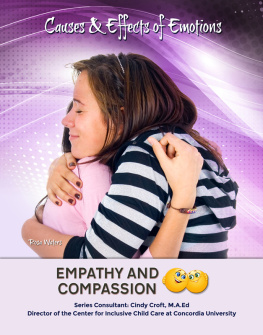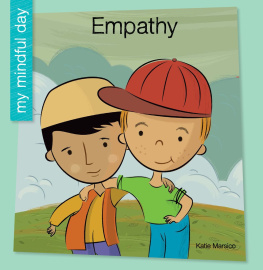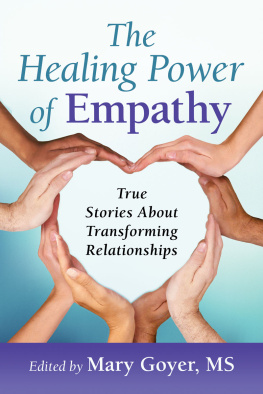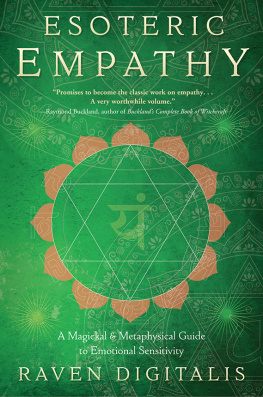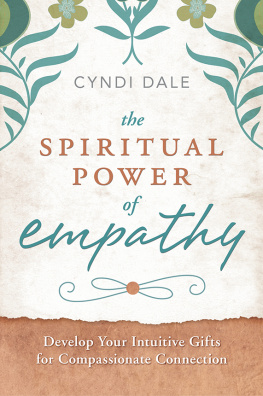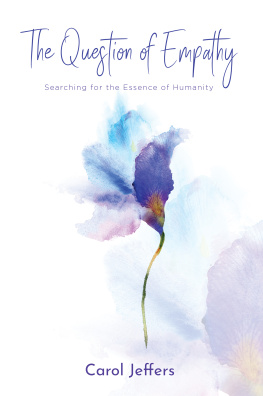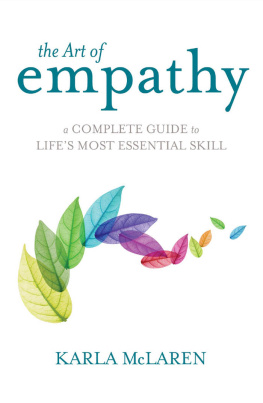Copyright 2018 by Cris Beam
All rights reserved
For information about permission to reproduce selections from this book, write to or to Permissions, Houghton Mifflin Harcourt Publishing Company, 3 Park Avenue, 19th Floor, New York, New York 10016.
hmhco.com
Library of Congress Cataloging-in-Publication Data
Names: Beam, Cris, author.
Title: I feel you : the surprising power of extreme empathy / Cris Beam.
Description: Boston : Houghton Mifflin Harcourt, 2018. | Includes bibliographical references and index.
Identifiers: LCCN 2017045815 (print) | LCCN 2017052085 (ebook) | ISBN 9780544558175 (ebook) | ISBN 9780544558168 (hardback)
Subjects: LCSH : Empathy. | Emotions. | BISAC: PSYCHOLOGY / Emotions. | PSYCHOLOGY / Interpersonal Relations. | PSYCHOLOGY / General.
Classification: LCC BF 575. E 55 (ebook) | LCC BF 575. E 55 B 43 2018 (print) | DDC 152.4/1dc23
LC record available at https://lccn.loc.gov/2017045815
Cover design by Martha Kennedy
Cover photograph Shana Novak/Getty Images
Author photograph m Burgess
v2.0418
Excerpt from Islands (1976) by Muriel Rukeyser used by permission of the estate of Muriel Rukeyser.
For Teresa
Islands
O for Gods sake
they are connected
underneath...
Muriel Rukeyser
Authors Note
This is a work of nonfiction. A very few names have been changed to protect identities; these are marked in the text or in notes at the back of the book.
Introduction
Every generation, a phrase enters the American consciousness and interrupts collective action like a boulder changing the course of a stream. In the 1960s, the phrase was civil rights; in the 1980s, it was self-esteem; now our word is empathy. Like the terms that came before it, empathy sounds redemptiveits an orientation that, should we adopt it en masse, could extricate us from our violence and our greed. But its also a term so varied in meaning and slippery in application, it can have ambiguous, even deleterious, effects. Empathy, when applied artfully and in the right contexts, can be highly moral and deeply liberatingbut its not an empty gesture to be spread atop every interaction in this new and troubled millennium. We have to understand both its purpose and practice, and this book is an attempt to do just that.
One example that can stand in for many: In the aftermath of the 2016 election, empathy has been weaponized. On one side, progressives argue that an empathy deficit, in part, is to blame for how the election blindsided them; when they thought Hillary Clinton was a shoo-in, a paucity of imagination kept them from truly seeing the swath of voters that could choose Donald Trump. Now many on the left feel they need to deploy empathy, in a gesture of unity and understanding that was so clearly missing in 2016. On the other side, voices have erupted in a chorus against empathy for Trump supporters: Trump is a bigot, they cry, and if he (and they) cant have empathy for us, why should we have empathy for them?
But I have learned in writing this book that empathy is not one singular thing. It can, when its contextualized the way it is above, serve as a way to be meek and deferential, or as a tool to withhold from political enemies, but it can also be instead an immediate gesture of common humanity. It can be innate, elemental, as difficult to stanch as love. Other times, empathy operates as a kind of karmic loop: empathy for the one affects the whole and vice versa. So what are we talking about when we talk about empathy?
One arena thats directing our current American associations with the word is the corporate one, so lets start with the place many of us begin our days: on Facebook. For years, Facebook users pressured headquarters to create a dislike button, but Mark Zuckerberg wouldnt bite. He admitted that some posts are sad or maddening or anything but likable but said disliking wasnt the online culture he wanted to build. Instead, in 2015, he said he planned to incorporate some kind of clickable empathy button. Facebook came out with four emoji faces: happy, sad, surprised, and angrynew emblems to say, I see your post, and I feel your pain.
Mark Zuckerberg may hope his 1.5 billion monthly users feel like theyre feeling morebut the richer our experience, the richer Facebook becomes. Online, we are both the consumer and the product, as Facebook earns $5.84 billion a quarter selling our demographics and our likes. In these days of DVR and streaming, corporations can no longer rely on the mass-market commercial to reach an audience; instead they count on courting us individually online. When we buy dog food one day and find a charticle from Purina in our newsfeed the next, we no longer find it strangewe know our electronic DNA is scattered on every screen we touch to be gathered and sold to marketers. Some may find this comforting, and some may call it surveillance, but whats interesting is what the corporations call it: empathy.
Empathic marketing, empathic brandingthese are the hot corporate buzzwords wending their way through business schools and ad agencies now. Corporate Empathy Is Not an Oxymoron. So reads a recent Harvard Business Review headline, with the claim that enlightened companies are increasingly aware that delivering empathy for their customers, employees, and the public is a powerful tool for improving profits.
This corporate definition of empathy connotes getting to know and understand a consumer baseour tastes, our spending habits, our personal needsto sell us more stuff. Empathic design is another burgeoning field, wherein marketers and designers work with people to identify latent needs and feelings about certain products and then, from that information, build new things to sell them.
You could argue that the corporate worlds commodification of empathy is simply the bastardization of a term, but Id argue that something deeper is afoot. Capitalism is milking the trend of all things empathy, but its also building a culture that perverts our very understanding of the concept. In other words, as we expect our watches, our phones, our computers, to provide us with experiences curated solely for us, we feel empathized with in a particular way, which has led consumers to need a particular kind of empathy. Through our everyday interactions with commerce, we attune to a cultural value shift that marks empathy as acquisitional and profitable.
For example, in education: In a recent Education Week article, the author defines empathy as a skill and advises teachers to create lesson plans in empathic design. Another, titled Empathy, Strategy and Edupreneurship: Fostering a Culture of Innovation, cites increased student learning as the profit of the classroom. In one Forbes article, called Why We Should Teach Empathy to Improve Education (and Test Scores), the writer comes from Ashoka, the $70 million nonprofit founded by management consultant Bill Drayton to support social entrepreneurs across the globe. This is an instance of Ashokas content marketing in mainstream journalism. One of Ashokas projects is called the Empathy Initiative, whose goal is to create a world committed and equipped to ensuring that every child masters empathy. Im fascinated by this messianic notion, and when I interviewed Ashokas director, by her assertion that we live in a world that values success and values empathy. Companies are clamoring for this skill.
In this book, I cast a critical gaze on both this impetus for empathy and the type of empathy were clamoring foras empathy, the movement, continues to gain ground. After all, at first blush, empathy sounds perfectly desirable. It sounds like its about understanding and even caring for your fellow human beings, a precursor to a fair society. But I worry about the ways empathy is increasingly positioned as a skill, something to be coveted and calculated, rather than a more ineffable ethic or a value, practiced out of instinct and for some intrinsic moral good. So in



